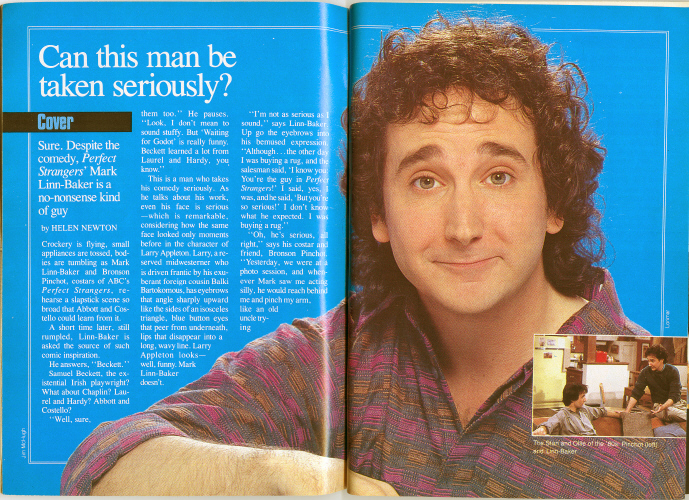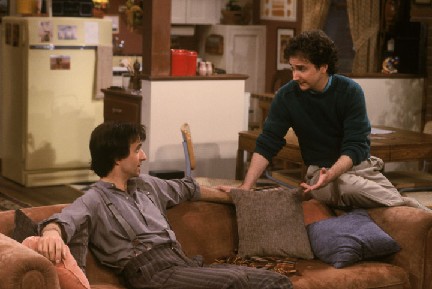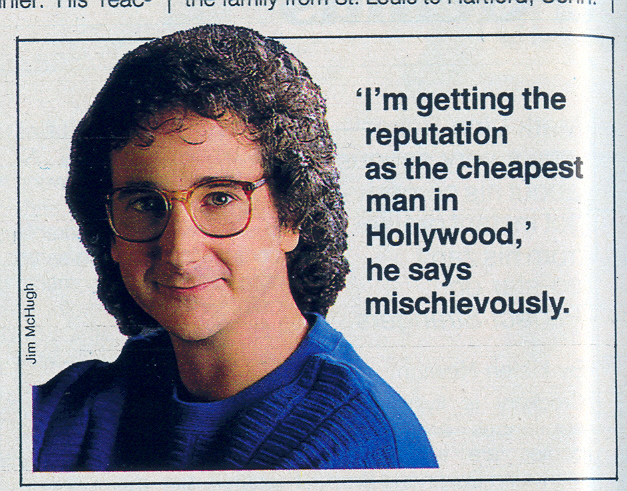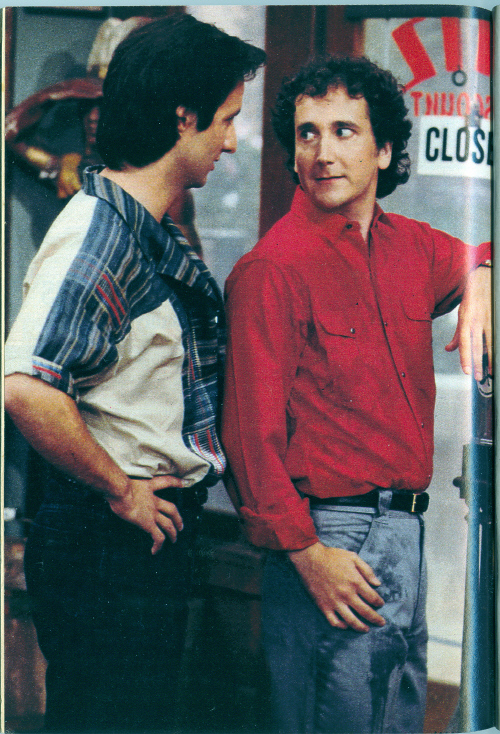 Crockery is flying, small appliances are tossed, bodies are tumbling as Mark Linn-Baker and Bronson Pinchot, costars of ABC's Perfect Strangers, rehearse a slapstick scene so broad that Abbott and Costello could learn from it.
Crockery is flying, small appliances are tossed, bodies are tumbling as Mark Linn-Baker and Bronson Pinchot, costars of ABC's Perfect Strangers, rehearse a slapstick scene so broad that Abbott and Costello could learn from it.
Can this man be taken seriously?
Sure. Despite the comedy, Perfect Strangers' Mark Linn-Baker is a no-nonsense kind of guy
by Helen Newton
 Crockery is flying, small appliances are tossed, bodies are tumbling as Mark Linn-Baker and Bronson Pinchot, costars of ABC's Perfect Strangers, rehearse a slapstick scene so broad that Abbott and Costello could learn from it.
Crockery is flying, small appliances are tossed, bodies are tumbling as Mark Linn-Baker and Bronson Pinchot, costars of ABC's Perfect Strangers, rehearse a slapstick scene so broad that Abbott and Costello could learn from it.
A short time later, still rumpled, Linn-Baker is asked the source of such comic inspiration.
He answers, ''Becket.''
Samuel Beckett, the existential Irish playwright? What about Chaplin? Laurel and Hardy? Abbott and Costello?
''Well, sure, them too.'' He pauses. ''Look, I don't mean to sound stuffy. But 'Waiting For Godot' is really funny. Beckett learned a lot from Laurel and Hardy, you know.''
This is a man who takes his comedy seriously. As he talks about his work, even his face is serious--which is remarkable, considering how the same face looked only moments before in the character of Larry Appleton. Larry, a reserved midwesterner who is driven frantic by his exuberant cousin Balki Bartokomous, has eyebrows that angle sharply upward like the sides of an isosceles traingle, blue button eyes that peer from underneath, lips that disappear into a long, way line. Larry Appleton looks--well, funny. Mark Linn-Baker doesn't.
 ''I'm not as serious as I sound,'' says Linn-Baker. Up go the eyebrows into his bemused expression. ''Although... the other day I was buying a rug, and the salesman said, 'I know you: You're the guy in Perfect Strangers!' I said, yes, I was, and he said, 'But you're so serious!' I don't know what he expected. I was buying a rug.''
''I'm not as serious as I sound,'' says Linn-Baker. Up go the eyebrows into his bemused expression. ''Although... the other day I was buying a rug, and the salesman said, 'I know you: You're the guy in Perfect Strangers!' I said, yes, I was, and he said, 'But you're so serious!' I don't know what he expected. I was buying a rug.''
''Oh, he's serious, all right,'' says his costar and friend, Bronson Pinchot. "Yesterday, we were at a photo session, and whenever Mark saw me acting silly, he would reach behind me and pinch my arm, like an old uncle trying to make a kid behave. He's very serious--and I'm very black and blue!''
Pinchot, who plays Balki with scene-chewing gusto, doesn't give anyone the impression that he's serious. He yells bawdy comments to the script girl, he tackles Linn-Baker, he teases the camera crew.
And likewise, his Balki, with the laughable accent, the E.T.-like naivete about American ways, even the catch phrase ''Doan be reedeeculus,'' commands attention. On filming night, for instance, one member of the audience stood up and shouted, ''Is there a Balki fan club?''
''Sure, Balki gets noticed,'' shrugs Linn-Baker. ''But this is a relationship show. There are only so many jokes you can do about someone who doesn't know how to use something.''
 ''As far as the initial thrust of the series goes, you have to feel that Balki is the heat,'' agrees director Joel Zwick. ''He's the reason the show exists. He's the stranger in the strange land. But now that people have had a chance to get used to the wildness of Balki, I'm starting to hear more and more just how good they think Mark Baker is.
''As far as the initial thrust of the series goes, you have to feel that Balki is the heat,'' agrees director Joel Zwick. ''He's the reason the show exists. He's the stranger in the strange land. But now that people have had a chance to get used to the wildness of Balki, I'm starting to hear more and more just how good they think Mark Baker is.
''The two of them really work well together. For instance, about a scene, Bronson will say, 'We need a big explosion here'--meaning a funny bit of business or something. And he's usually right. And then Mark and I will structure it so it works. Mark's a craftsman.''
Like any craftsman, Linn-Baker worries over details. On the day before filming, when actors, director and crew map out the cumbersome choreography that makes a show go smoothly, Linn-Baker works his way through the script one tiny moment at a time.
''My left hand is funnier here. Don't you think I should use my left hand?'' asks Linn-Baker as he and Pinchot stage a stunt.
'' 'That's why you're having the dream' or 'That's why you're having the nightmare.' Which one's funnier?'' he demands of the script girl about one of his lines.
''We need three 'OKs' here. Three 'OKs' are funnier than two 'OKs'.''
OK, OK, OK. So none of that stuff seems funny by itself. But by the end of the day, the stunts move almost as fluidly as a Fred Astaire routine, and the funny lines are in sync with the funny faces. Those little things may not get laughs by themselves, but as Zwick and Linn-Baker point out, it's harder getting the laughs without them.
Perhaps it's because Mark Linn-Baker, 33, has been around acting all his life that he is attuned to the fine points. His parents were actors, too; they met when his father directed his mother in a show. After marriage and family, his father traded in his dreams of full-time theater work for ad copywriting and moved the family from St. Louis to Hartford, Conn.--but both parents still gave their free time to community theatre. Linn-Baker started his career pulling curtains for his parents at age 7 and continued acting all through high school. Theatre won out over math or psychology at Yale, and he spent three postgraduate years earning an MFA in drama.
''I've been lucky. I've worked nonstop since I got out of Yale,'' he says, knocking wood as he habitually does when the subject is his good fortune. Though his work was only barely lucrative enough to allow him to live in a small apartment on the inelegant Lower East Side, it was satisfying. He won the lead in the New York Shakespeare Festival's production of ''All's Well That Ends Well'' and went on to do, among others, ''Othello'' and ''Alice In Concert'' with Meryl Streep. In 1981, director Richard Benjamin saw him in performance at the Public Theater, and later directed him in his first feature film role--as Peter O'Toole's keeper in ''My Favorite Year.''
 Far from being intimidated at sharing the stage with a legendary star, Linn-Baker says he happily spent evenings in O'Toole's trailor, swapping theatre stories. ''He's a wonderful actor. His background is in live theatre, as mine is, but he's worked so often in film that it was an education watching him.''
Far from being intimidated at sharing the stage with a legendary star, Linn-Baker says he happily spent evenings in O'Toole's trailor, swapping theatre stories. ''He's a wonderful actor. His background is in live theatre, as mine is, but he's worked so often in film that it was an education watching him.''
''My Favorite Year,'' a big hit, would have been the perfect springboard to movie stardom--or at least employment--if only Linn-Baker could have taken seriously any of the offers that followed. ''I was sent a lot of really dumb comdies,'' he says. Instead, he decided to stay in New York, where he continued working in the theatre, helped start a summer drama program at Vassar College in Poughkeepsie and began contemplating his financial future.
Such thoughts led him eventually to do a few commercials, guest star on a few series (Moonlighting, The Equalizer) and accept a starring role in Perfect Strangers when producers Tom Miller and Bob Boyett offered it to him.
Pinchot remembers struggling through the auditions for the right Larry. ''They had written a little scene to see if we'd generate any chemistry. I had just done it with four different actors, and I was getting depressed. Then in came Mark. It was suspect how quickly we hit it off. He said three words, and jumped up and grabbed him and yelled, 'You're a genius!' He wasn't even surprised. He just said, 'Thank you very much'.''
The shows rapport with its audience has been somewhat less wholehearted, ranking in the low thirties against NBC's Highway To Heaven. ''If we come n a good second, ABC will be pleased,'' says Miller, adding optimistically, ''but I think the show is in for a long run.''
In his impersonal rented apartment overlooking the Pacific, Linn-Baker muses on the possibility of a long run. ''I've never had a job before that didn't end,'' he says. ''I still can't count on this one.'' The only thing he's bought is a TV set; his VW convertible, even his sparse beige furniture, is leased. ''I'm getting the reputation as the cheapest man in Hollywood,'' he says mischievously.
Stacks of New York Times Sundaymagazines provide the only decor. ''I realized that I have one for each week that I've been on the show. I can't throw them out,'' says Linn-Baker, recognizing them as symbols of a life he misses. He has a girlfriend, a choreographer, in New York and recently bought a co-op apartment on Lower Broadway. He plants to spend as much time there as his breaks from Perfect Strangers allow.
''The wonderful thing about Strangers is that is gives me the money and the time to do the theatre I really want,'' he admits, then adds hastily: ''Not that I'm not proud of the show. I am--I think we do really good work.''
It's work that has gained him a very special fan--Lucille Ball. ''Her husband wrote to say that they enjoy our show,'' says Linn-Baker proudly. ''And then at the Emmys, I met her and she said some very nice things. Coming from her, that means a lot.''
It probably would have meant even more coming from Samuel Beckett.